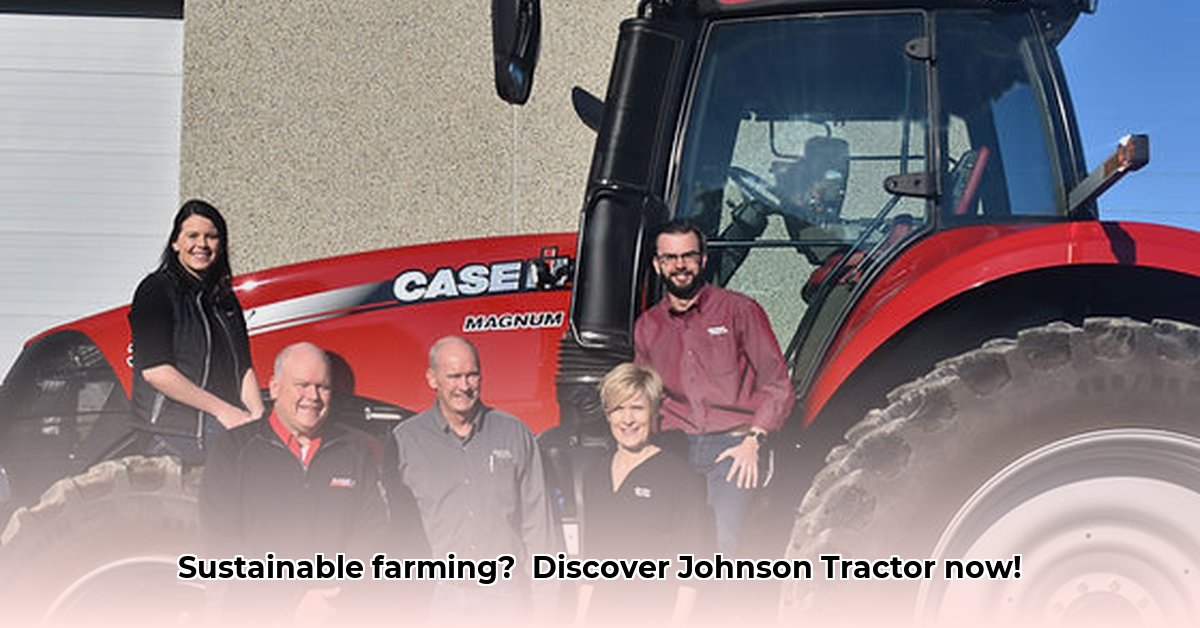
Johnson Tractor Harvard: A Cornerstone of Sustainable Agriculture
Johnson Tractor in Harvard, Illinois, is more than a farm equipment dealership; it's a vital component of the local agricultural ecosystem. They provide a comprehensive range of services, from equipment sales and maintenance to precision farming technology, acting as a significant support system for local farmers striving for sustainable practices. This case study examines Johnson Tractor's role, explores its contribution to sustainable agriculture, and offers actionable recommendations for its continued success. For more information on their Harvard location, visit their website.
A Deep Dive into Johnson Tractor's Operations
Johnson Tractor's Harvard location is a bustling hub, offering sales of new and used equipment, expert repair services, and a dedicated precision farming department. This integrated approach provides farmers with complete support from purchase to maintenance, a crucial element in the demanding world of modern farming. However, while their commitment to customer service is evident, the specific details regarding measurable contributions to sustainable farming require further investigation. Current public information primarily focuses on equipment offerings, lacking detailed information about environmental initiatives.
Precision Farming: The Path to Sustainable Practices
A key aspect of Johnson Tractor's potential contribution to sustainable agriculture is their commitment to precision farming technologies. Precision agriculture optimizes farming by using technology to minimize waste and resource utilization. GPS-guided machinery allows for precise planting and harvesting, reducing waste and maximizing yield. Variable-rate technology (VRT) for fertilizer and pesticide application ensures that crops receive only the necessary amounts, minimizing environmental runoff and improving soil health. (VRT = Using technology to apply varying amounts of inputs like fertilizer or pesticides based on the specific needs of different areas within a field). Despite this potential, quantifiable data on the extent of Johnson Tractor's influence on local sustainable agriculture practices is currently unavailable. Further research is essential to assess its precise environmental impact.
Sarah Miller: A Case Study in Sustainable Farming Success
To illustrate the impact of Johnson Tractor's services, consider Sarah Miller, a local farmer who relies heavily on the dealership for equipment and expertise. Facing challenges common to many farmers—rising input costs, stricter regulations, and increasing consumer demand for sustainable food—Sarah leverages precision planting technology from Johnson Tractor to optimize seed spacing, improve germination rates, and maximize yields. The ongoing support from Johnson Tractor ensures her machinery runs efficiently, minimizing downtime and maintenance expenses. This demonstrates how the dealership's support extends beyond equipment sales, fostering sustainable practices at a local level. This success story, while anecdotal, highlights the potential impact on broader sustainable agriculture within the community.
Actionable Recommendations for Sustainable Growth
To further enhance its contribution to sustainable agriculture, Johnson Tractor should implement the following actions:
Enhance Online Presence (Short-Term): Develop a more robust online presence clearly outlining their sustainability initiatives. Feature local farmer success stories highlighting the benefits of precision agriculture. This improved transparency will enhance their public image and attract environmentally conscious customers.
Offer Training and Workshops (Mid-Term): Conduct workshops and training sessions on sustainable farming practices and utilizing precision agriculture technologies effectively. This will empower farmers to adopt sustainable techniques independently, resulting in widespread community-wide benefits.
Develop Strategic Partnerships (Long-Term): Forge partnerships with local environmental organizations and relevant government agencies focusing on sustainable agriculture. Invest in advanced staff training to expand expertise and credibility. This collaborative approach will increase access to funding, shared knowledge, and amplify their impact.
Conclusion: A Collaborative Approach to a Greener Future
Johnson Tractor Harvard holds significant potential to be a regional leader in promoting sustainable agriculture. Although a comprehensive assessment of its current environmental impact needs further research, their commitment to farmers and access to advanced technologies are evident. By implementing the recommended steps, Johnson Tractor can reinforce its role in supporting local environmental sustainability, potentially setting a model for other dealerships to adopt. The journey towards truly sustainable agriculture demands consistent evaluation, adaptation, and collaborative effort across the entire agricultural value chain.